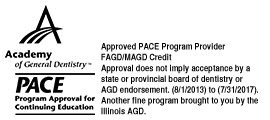Navigation

- This event has passed.
Protocol Presentations: DoubleTree by Hilton- Wood Dale-Elk Grove
October 22, 2015
Event Navigation
Protocol Presentations
October 22, 2015 at 5PM
at
DoubleTree by Hilton Wood Dale/Elk Grove/Itasca
1200 N. Mittel Blvd.
Wood Dale, IL 60191
630-860-2900
Please RSVP with Dr. Sy Wachtenheim by October 18, 2015 to present protocol reports on past Mastertrack Sessions at 847-858-1927 or [email protected].
Protocol presentations offer attendees to more than double their CE participation hours earned per program.
As an aspiring Master in the AGD, it is both an honor and an obligation to be able to share your knowledge and experiences with others. There is no better format to improve those presentation skills than with the protocol reporting sessions available to those who have taken a PACE/ CERP approved participation course.The objective of taking a participation course and then doing a protocol session is to (1) instruct the participant in the practical application of a skill(s), (2) for the participant to do that procedure(s) in his/her office, and (3) to then show the protocol facilitator (and others presenting that day) how this procedure was done by you.
In short: See it done, Do it in your office, and Teach others by showing what you have done. You will learn the most from the “teach” part of this triad!So, what is the best way to “teach”?Tell the “story” about the case/s. Yes, from “once upon a time” to “happily ever after” with all that went on between the two. The method is the same. Deliver this story so that each member of the audience can share the experience simultaneously.Suggestions: Do a PowerPoint presentation, with good photos to support the “story”, handouts, models (or photos of the models), and a literature search to support the case. Remember that the story is first, the photos support it. Not the other way around!**Sit in on a protocol session and see how others present. Emulate a style you like; others will like it, too.
This might be an outline to follow:
1. Title to describe what the presentation is about
2. Patient chief complaint
3. Medical/ Dental/Social history
4. Pre-operative dental charting.
5. Established need for treatment: Diagnosis(s)
6. Prognosis
7. Treatment plan with objectives & rationale for treatment provided
8. Photographs, radiographs, and models (if applicable) of the case prior to starting treatment.
9. Photographs, radiographs, and models as the case progresses
10. What went right; what went wrong.
11. Post treatment photographs, radiographs, and documentation.
12. What was learned from this case? What would you do differently next time?
1. Title to describe what the presentation is about
2. Patient chief complaint
3. Medical/ Dental/Social history
4. Pre-operative dental charting.
5. Established need for treatment: Diagnosis(s)
6. Prognosis
7. Treatment plan with objectives & rationale for treatment provided
8. Photographs, radiographs, and models (if applicable) of the case prior to starting treatment.
9. Photographs, radiographs, and models as the case progresses
10. What went right; what went wrong.
11. Post treatment photographs, radiographs, and documentation.
12. What was learned from this case? What would you do differently next time?
Think about this as if you are a member of the audience and would like to know everything about the case. You want to know about the patient, the problems, the treatment plan and how it was carried out, the problems encountered and how they were solved (or not), the materials used, the final result and how you would do the case if given another chance.
You have information others need! Develop the skill to share it!
Protocol presentations offer attendees to more than double their CE participation hours earned per program.
For more information please contact Dr. Sy Wachtenheim at [email protected] or at 847-858-1927.

